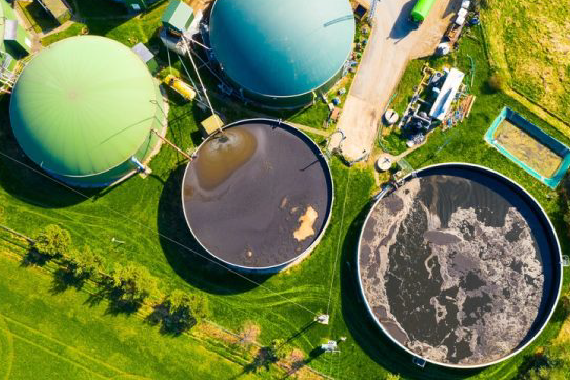We collaborate to achieve sustainable success
A leading environmental solution provider
Get in touch with usRenewable Natural Gas: The Carbon-Negative Solution Powering America's Green Transition
As the global imperative for decarbonization intensifies, businesses are actively seeking pragmatic and impactful solutions to reduce their environmental footprint. Among the most promising is Renewable Natural Gas (RNG), a versatile and increasingly vital component of America's green transition. Unlike traditional fossil fuels, RNG offers a unique suite of environmental attributes, including significant carbon-negative potential, coupled with the distinct advantage of seamless integration into existing energy infrastructure. This makes RNG an appealing and immediate solution for companies striving to achieve tangible environmental benefits and advance their sustainability goals.
What is Renewable Natural Gas?
Renewable Natural Gas is a pipeline-quality natural gas derived from the decomposition of organic matter. The process begins with raw biogas, which typically contains 45-65% methane, a potent greenhouse gas. This raw biogas undergoes a rigorous upgrading process that removes moisture, carbon dioxide, and trace contaminants to achieve a methane content of 90% or greater, making it suitable for direct injection into natural gas pipelines.
Sources for biogas production are diverse, including municipal solid waste landfills, wastewater treatment plants, livestock farms, food production facilities, and various organic waste management operations.
The Carbon-Negative Potential: A Powerful Environmental Attribute
The environmental benefits of RNG are substantial, particularly its role in methane mitigation and carbon displacement:
- Methane Capture and Mitigation: RNG projects actively capture and recover methane that would otherwise be vented and released into the atmosphere from landfills or anaerobic digestion (AD) plants. This is a critical environmental benefit because methane is a potent greenhouse gas, possessing a global warming potential over 25 times that of CO2 and a relatively short atmospheric lifespan of 12 years. Reducing these emissions offers immediate and impactful climate mitigation.
- CO2 Displacement and Air Quality Improvement: RNG directly displaces conventional fossil-derived natural gas in various applications. When utilized as a transportation fuel, it can significantly reduce emissions of nitrogen oxides and particulate matter, leading to improved local air quality compared to traditional diesel or gasoline engines. On a lifecycle basis, substituting fossil fuels with RNG can lead to substantial reductions in CO2 emissions, with up to 40% lower emissions when used as a transportation fuel compared to conventional natural gas.
Seamless Integration into Existing Infrastructure
A key advantage distinguishing RNG is its seamless integration into existing natural gas infrastructure. RNG can be directly injected into existing natural gas pipelines, requiring minimal to no equipment or operational modifications for end-users. This inherent compatibility with current vehicle fleets and industrial equipment facilitates a much faster and more cost-effective rollout compared to alternative fuels like hydrogen, which necessitate significant new infrastructure investments. This ease of integration significantly lowers the barrier to adoption, making RNG a highly practical solution for immediate decarbonization efforts.
Economic Contributions and Broader Benefits
RNG has experienced rapid expansion since 2020, largely propelled by federal and state-level financial incentives that have rendered it both environmentally beneficial and economically viable. Programs such as the federal Renewable Fuel Standard (RFS) and California's Low Carbon Fuel Standard (LCFS) have substantially increased demand for RNG, rewarding producers with Renewable Identification Numbers (RINs) and carbon credits, which enhance RNG's cost-competitiveness against fossil-based natural gas.
This growth has translated into significant economic contributions:
- Job Creation: The construction and operation of RNG processing facilities have spurred job creation, particularly in rural communities where agricultural and landfill waste are abundant. In 2021 alone, the RNG industry contributed 22,600 jobs and $2.6 billion in GDP to the U.S. economy, with projections indicating an increase to over 100,000 jobs by 2030.
- New Revenue Streams: RNG provides innovative revenue streams for farmers and waste management companies by monetizing methane emissions that would otherwise be released into the atmosphere. Biogas generators can upgrade their gas, sell it into the energy grid, and capitalize on lucrative RINs, especially D3 and D5 RINs, thereby adding a strong financial component to their operations.
RNG is strategically positioned as a critical "bridge fuel" in the broader decarbonization journey. Its ability to deliver immediate and cost-effective environmental benefits, particularly in methane mitigation, by leveraging existing infrastructure, makes it a highly attractive and market-ready solution. This allows entities to achieve near-term sustainability goals and generate new revenue streams without the need for major capital overhauls, accelerating the transition to a cleaner energy future.
